Lawrence Arts, Quality of Life Entertwined
| 2016 Q3 | story by Bob Luder | photos by Steven Hertzog
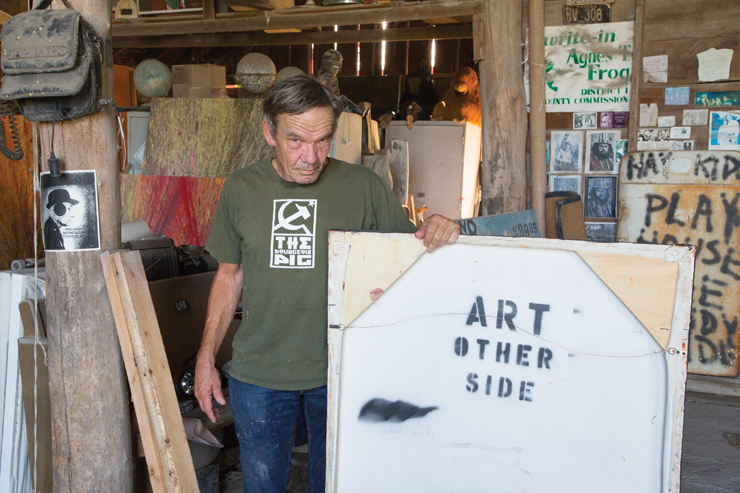
Local Underground Artist, Wayne Propst poses in his studio
Rick Mitchell is an Ivy League-educated artist of many genres mostly known locally for his commercial photography. Wayne Propst is a lifelong painter and multifaceted artist whose works not only have been displayed all around town but regionally and nationally. Cindy Novelo is a singer/songwriter who has put out two albums and performed at folk music festivals throughout the country.
Jeremy Osbern has produced more than 100 videos and participated in the Sundance Film Festival. Kim Tefft is a sculptor following in the footsteps of his locally famous father and recently finished work on what must be considered one of the most iconic sculptures in the city.
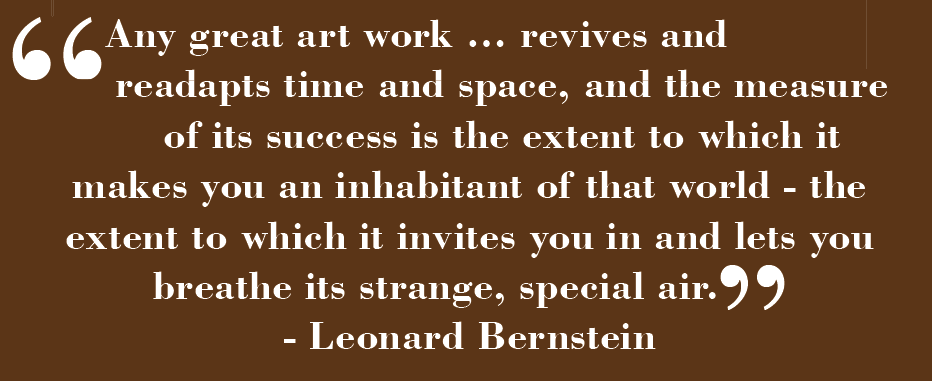
All of these people have one thing in common aside from their artistic backgrounds: Whether they left for extended periods of time and returned or stayed put most or all of their lives, all call Lawrence home. With a local arts scene that has a vibrant past and appears to be expanding all the time, they wouldn’t have it any other way.
“When I think about Lawrence and why it is people want to live here … it’s a quality of life issue,” Mitchell says. “Art is part of that. The magnetism of the arts and culture in Lawrence draws people in. When people live here or visit, they pay taxes, spend money. Collectively, all businesses benefit.”
Novelo, a classically trained musician who grew up in Lawrence but lived 17 years overseas before returning to be closer to family, is but one of hundreds of local artists who take great pride in her city being a cultural arts mecca of the Midwest.
“I remember reading a story in The New York Times several years ago that listed Lawrence as one of the more popular arts communities in the country,” says Novelo, who attended songwriting school in North Carolina and has played the Kerrville Folk Festival, in Kerrville, Texas, among others. “Lawrence is a happening place. You can never find a parking space. Every place is packed most every day.
“Not only is the artist benefiting economically, but all the people around, from the sound people to the food truck parked out back,” she says. “Downtown Lawrence has maintained its charm, and the arts scene is an important part of that.”
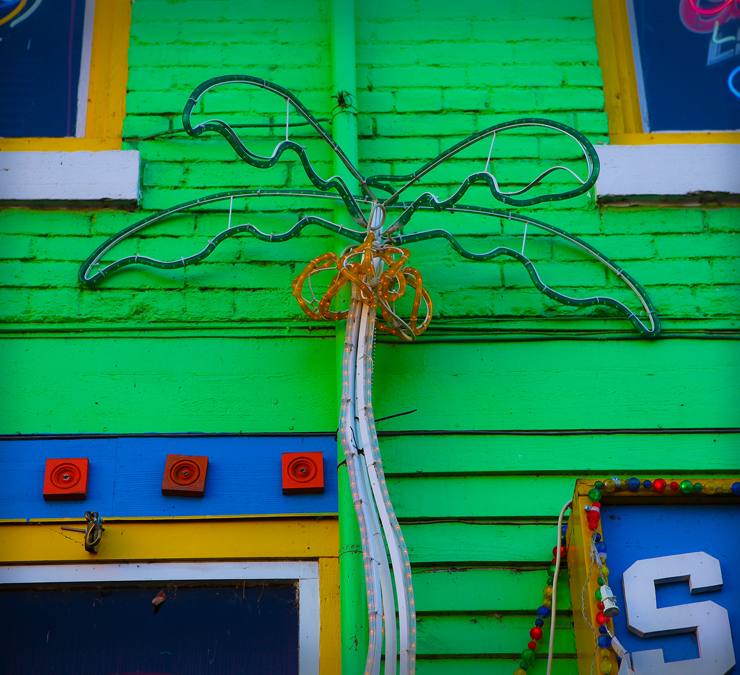
Rick Mitchell’s – The Sand Bar
Coming Home
Mitchell was born and raised here, but after graduating from the University of Kansas (KU) with his Bachelor of Fine Arts degree in 1972, he headed east, receiving his master’s degree two years later from Rutgers and also studying at Princeton and Drexel.
He majored in painting in college but found himself gravitating toward performance and conceptual art after moving east. While working on performance arts projects in New York City, he started looking for a way to document his work. That’s when he took up photography, a calling he eventually would make his business and living for many years, both as a professor of photography and a commercial photographer.
He lived and worked on the East Coast for 20 years before returning to Lawrence in 1992.
“Lawrence has always been home,” he says. “I came back for family reasons, but I really wouldn’t want to live anywhere else.”
After taking a job as an assistant professor of photography at Baker University, in nearby Baldwin City, he applied for the position of gallery director at the Lawrence Arts Center, which then was still housed in the Carnegie Building. He served in that role from 1992 to 2009.
“The gallery wasn’t really developed,” he says. “It was just a half-time job.”
Fortunately for Mitchell, it didn’t stay that way. The job grew rapidly, his title became exhibition program director and the Lawrence Arts Center prepared for its move to its current location on New Hampshire Street, between Ninth and 10th streets.
By 2009, he decided he’d accomplished about all he could there.
“I felt I’d done the job,” he says. “I wanted to devote time to art-making. Technically, I’m retired, but artists never retire. They just keep doing what they’re doing.”
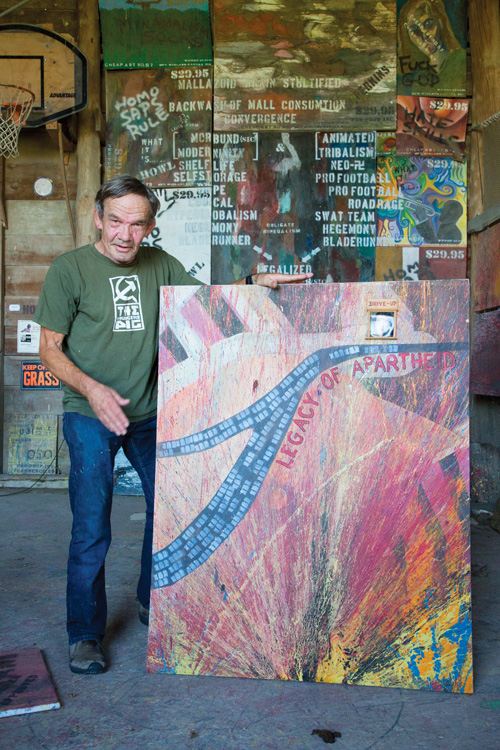
Wayne Propst in his studio
When he was a young art student in the 1960s and early ’70s, Mitchell says there was a bit of division in the Lawrence arts scene. When he returned home in 1992, it was a whole other story.
“The Lawrence Arts Center had formed, there was community theater, a community choir,” he says. “The arts scene had really grown up. There was a proliferation of artists. Today, a lot of art majors (at KU) stay.”
Mitchell says there’s still a need for more commercial art galleries in Lawrence, but he points to areas of growth, such as the Final Friday events that occur every month, bringing folks downtown to browse the gallery spaces that exist. Then, there’s the burgeoning Warehouse Arts District, which is forming on Ninth Street, between Massachusetts and Pennsylvania streets.
“That’s viewed as pivotal to the commercial arts scene,” he says.
The Impact of Final Fridays
One of the more popular art galleries in the Warehouse Arts District is the Cider Gallery, 810 Pennsylvania St., where Mitchell had a show of his photography last April and, more recently, Propst had a show of his paintings.
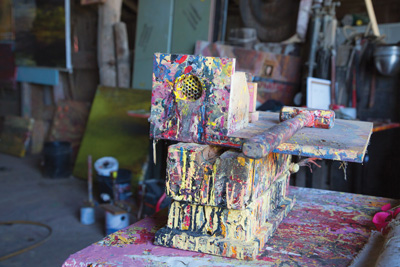
Wayne Propst tools of the trade
Propst grew up in Kansas City but attended KU in the mid-’60s and ’70s, and never left. While he says the Lawrence arts scene has evolved over the years, in many ways, it hasn’t changed at all.
“The rest of town has always had this huge, white suburb thing going on,” Propst says, “but there’s always been the same core of people making things. There’s a big range of what’s out there, plenty of people who make art.”
Propst says he and fellow artist and friend, Molly Murphy, once performed their own survey of the impact of one of the Final Friday events and were surprised by what they learned.
“We hung out in businesses and talked with a lot of people,” he says. “The impact shocked us at the number of people who come in from out of town. I think the economic benefits that the arts have brought to Lawrence are huge.”

Cindy Novello performs at Children’s Mercy Hospital as part of a Folk Alliance International outreach program
Taking the Long Way Home
Novelo also was born and raised in Lawrence, but took perhaps the most circuitous route in getting back home. From the age of 6, she received classical training on the piano and later added viola to her repertoire. But when it came time to select a major in college, she chose French, which allowed her to study in France for two years.
While in France, she also studied music at the famous University of Bordeaux.
She also lived for 10 years on a small island off Belize, in Central America. In addition to English, she speaks French and Spanish fluently.
A divorce and raising two young twin daughters prompted the move closer to home and family. She and the twins—Luna and Leila—settled in Vinland, a tiny nook (“There’s just a little general store,” she says) in the hills between Lawrence and Baldwin City.
And, Novelo set about writing music, much of it based on her experiences traveling the world and returning home. Her first album, titled “Stone’s Throw,” is filled with a lot of traditional folk and what she calls “classical Appalachian.”
“I love that sound,” she says. “It gets to the gut of the American experience.”
In a 2010 interview with KRUU Radio, in Fairfield, Iown, Heather Miller says of Novelo, “her arrangements and mournful sounds rise from the hollows of that region and reverberate with the melodies and traditions of both Medieval and Romantic Europe. The smoky peat fires of the Celts mix with the disciplined heat of full-on symphony.”
Her most recent release, “Meditation,” takes a lot of those same influences but adds World and Eastern music over the top.
“Music, for me, is about trying to help people get over divisions,” Novelo says.
While Novelo says the scene is pretty small for singer/songwriters in town, there is a lot of music to be consumed, be it classical performances at KU’s Lied Center, old-style folk or Appalachian performances at the Lawrence Arts Center, or indie rock shows at Liberty Hall, The Granada or The Bottleneck.
It all makes a positive economic impact on the city, she says. And, she knows from experience.
“When I was growing up, I had a grandmother who was Southern Baptist and very practical and traditional,” says Novelo, whose father was an electrician and mother a nurse. “During one point in the recession in the 1980s, everyone in my family was out of work except for myself and my sister, who was a ballet dancer.
“Arts are usually the first thing to get cut in a budget, but I think that’s a big mistake. Music develops the brain in a way other things do not,” she explains.
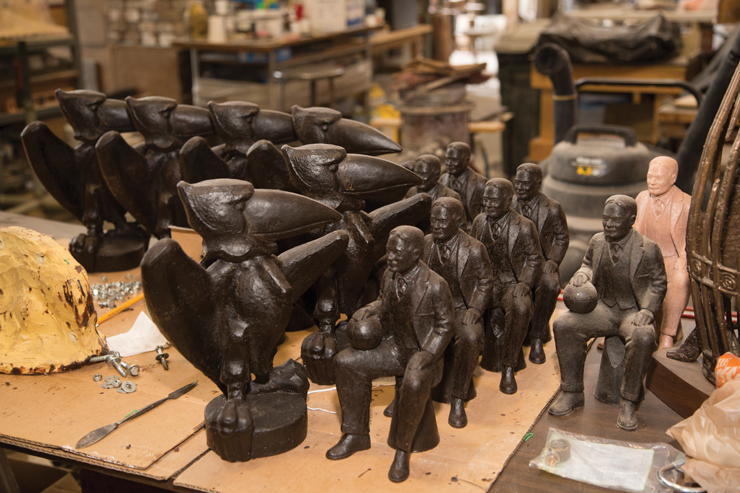
A table lined with Tefft’s maquettes of James Naismith and the Jayhawk
Sculptor By Birth
When Kim Tefft says he’s a sculptor by birth, he isn’t stretching the truth, not even a bit.
By the time he was born in 1956, Tefft’s father, the late Elden Tefft, already was six years into founding and developing the sculpture major at KU. He would go on to teach at KU another 34 years and become a highly respected and much-beloved artist in the Lawrence area. Like most boys, Kim grew up wanting to be like dad. He took up art at an early age and followed his father’s lead in working with bronze casting, majoring at KU in design in metals, diamond-setting and goldsmithing.
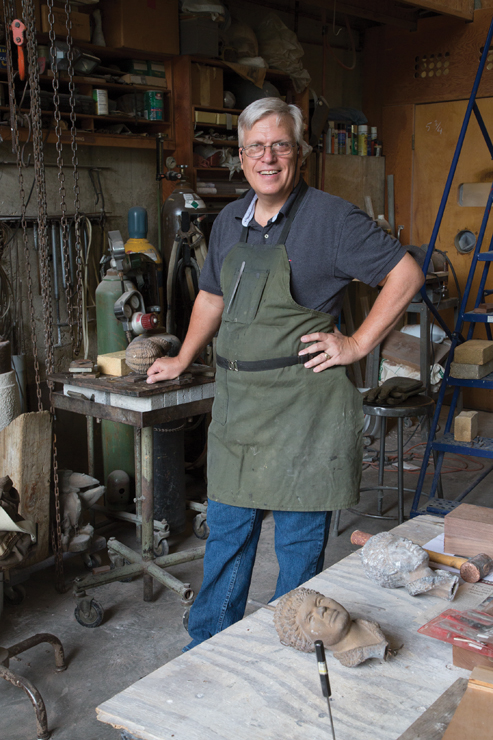
Kim Tefft
Of all the cherished Elden Tefft sculptures around the KU campus and around town—including the iconic Jayhawk out in front of Strong Hall—one probably stands out most: the figure of basketball inventor James Naismith outside the brand-new DeBruce Center, next to Allen Fieldhouse. Unfortunately, Elden died early in 2015, at the age of 95, before he could complete the work.
Kim stepped in and put the finishing touches on the sculpture last March.
“I think the city has been very receptive to the arts over the years,” he says. “Lawrence is still small enough that the arts scene can still be spread throughout the city. But, I think it’s a great idea to have an area where people know they can go and enjoy the arts. We appear to have that now downtown with the Warehouse Arts District.
“We have a good, supportive base around town, rounded out with good opportunities to sell things outside the community,” he continues.
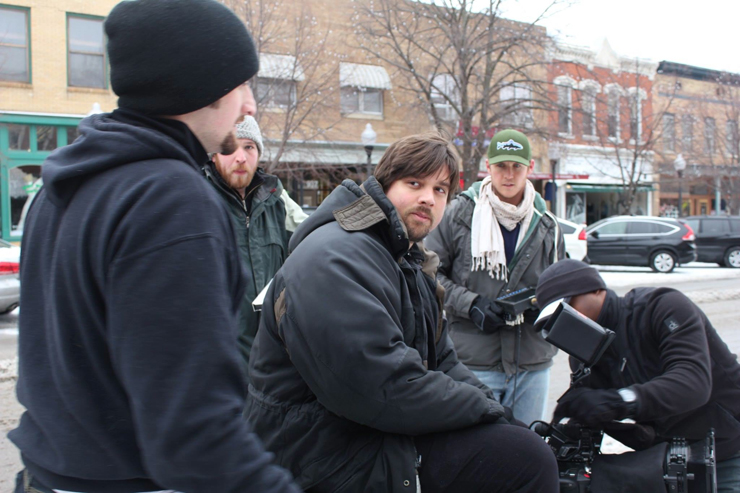
Jeremy Osbern owner and dirctor of Through A Glass productions setting up to shoot on Mass Street
Filmmaking in the Heartland
Jeremy Osbern has lived his entire life in Lawrence. But, when he graduated from KU with a degree in film, everyone told him he had to move to either New York or Los Angeles to have any way of making it.
The pride practically drips from his voice as he speaks of proving those predictions completely wrong. Osbern and business partner Chris Blunk formed Through A Glass Productions in 2004. The goal was simple: to tell the stories they wanted to tell, make the films they wanted to make and, most importantly, live where they wanted to live.
During the last 12 years, the company has produced more than 100 films, from full-length features to shorts to commercials. Osbern’s first full-length feature, “AIR: The Musical,” was played at 20 film festivals and, in 2010, received distribution over four continents.
Osbern and Blunk also started the filmmaking program at the Lawrence Arts Center and taught classes there for years before their Through A Glass schedules became so busy they were forced to hand those over to others.
“In Lawrence, we’re so inundated with art, I think sometimes residents take it for granted,” says Osbern, who is working on a stand-up comedy special that has Louis C.K. among its producers. “I think the city has been very supportive. The Free State Festival in June has the budget to bring in international film speakers. There’s a lot of financial funding.”
Osbern says when he and Blunk moved into their current office space in the Warehouse Arts District, there were probably two artists in the area. Today, there are upwards of 50.
It’s all part of the growth and evolution that keeps Osbern—and all of his fellow Lawrence artists—proving the naysayers wrong. The little burg on the Kaw has become a big Midwest arts mecca.
“When I first started going to festivals, jaws would just drop when we told them we were making films in Lawrence,” Osbern says. “Now, it’s much more common. Producers are more interested in talking about making a film in Kansas.”

35 Comments
mГ©dicament pour odeur intime pharmacie sans ordonnance: diamox sans ordonnance – epitheliale ah duo
megavir timogel collirio lansoprazolo 15 mg
se puede comprar azitromicina sin receta: marcação online teste covid farmacia – se puede comprar ramipril sin receta
impetex crema prezzo: Farmacia Subito – farmacia online.
achat viagra en ligne: Pharmacie Express – orl besoin ordonnance
https://pharmacieexpress.com/# bloxaphte gel junior
xenical en pharmacie sans ordonnance: sildenafil 100mg pharmacie en ligne – tadalafil 20 mg pas cher
avamys spray nasale prezzo: Farmacia Subito – finasteride biorga
antidepresseur sans ordonnance: ̩ther pharmacie sans ordonnance Рsildenafil viagra
mГ©dicament anti stress sans ordonnance: sirop angine sans ordonnance – pommade Г base de cortisone sans ordonnance
pillola fedra prezzo combantrin prezzo farmaci per aumentare le difese immunitarie
test infection urinaire pharmacie sans ordonnance belgique: malarone sans ordonnance – vitamine d sans ordonnance en pharmacie
pharmacie en ligne sans ordonnance belgique: vaccin grippe sans ordonnance pharmacie – pharmacie diarrhГ©e sans ordonnance
http://farmaciasubito.com/# fluimucil 500 aerosol prezzo
farmastar farmacia online: farmacia online cordoba argentina – se puede comprar viagra en espaГ±a sin receta medica
neoduplamox bambini sciroppo 140 ml: mederma gel cicatrici – farmacia online sicura
buy medicine from india: pharmacy in india – indian online pharmacy
https://pharmexpress24.shop/# humana rx mail order pharmacy
online medicine order: indian online pharmacy – india pharmacy cialis
gold rx pharmacy: Pharm Express 24 – rx choice pharmacy
http://inpharm24.com/# online india pharmacy
overseas pharmacy india: aster pharmacy india – history of pharmacy in india
doctor of pharmacy india: InPharm24 – drugs from india
adderall mexican brand: online mexican pharmacy ozempic – pain killers in mexico
when first pharmacy course was started in india: InPharm24 – india pharmacy no prescription
http://inpharm24.com/# online pharmacy india ship to usa
buy medicine online india: online pharmacy india – pharmacy in india
pharmacy course india: india rx – when first pharmacy course was started in india
http://pharmexpress24.com/# online otc pharmacy
neighbor rx pharmacy: viagra pharmacy uk – american online pharmacy
clomid pharmacy online: Pharm Express 24 – people’s pharmacy prilosec
Cefadroxil: no prescription required pharmacy – superdrug pharmacy doxycycline
http://inpharm24.com/# medications from india
mexico pharmacy accutane: pharmacy bangkok kamagra – new zealand online pharmacy motilium
lumbar spine pain management houston: cheap antibiotics online – pharmacy cancun mexico